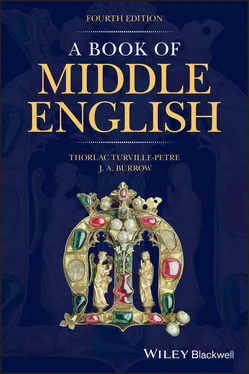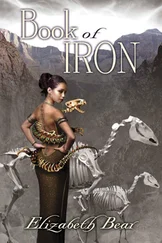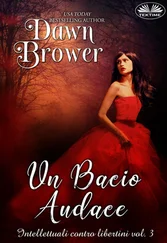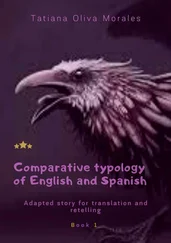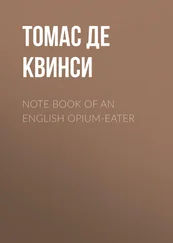1 ...6 7 8 10 11 12 ...27
|
(a) |
(b) |
| sg.nom./acc . |
engel |
nome |
| gen . |
engles |
nome |
| dat . |
engle |
nome |
| pl.nom./acc . |
engles |
nomen |
| gen . |
engles or engle or englene |
nomen |
| dat . |
engles or engle |
nomen |
Some examples from texts 2, 3 and 4 in this book will better illustrate the wide diversity of noun‐endings in these early texts:
| gen. sg . |
havekes , ‘hawk’s’, 2/271; Drihtenes , ‘God’s’, 3/23; helle , ‘of hell’, 4/34. |
| dat. sg . |
from þe liʒte , ‘from the light’, 2/198; to Arðure , ‘to Arthur’, 3/1; on his steden , ‘on his horse’, 3/25; in helle , ‘in hell’, 4/41; but wið ʒelp , ‘with boasting’, 4/2. |
| nom./acc. pl . |
tide , ‘hours’, 2/26 (OE pl. tīda ); crowe , ‘crows’, 2/304 (OE crāwan ); wepnen , ‘weapons’, 3/52 (OE wpen ); hundes , ‘dogs’, 3/115 (OE hundas ); deoflen , ‘devils’, 4/32 (OE dēoflas ). |
| gen. pl . |
wise , ‘of ways’, 2/20; kingen , ‘of kings’, 3/113; Ancrene Wisse , ‘Anchoresses’ Guide’, 4/ title (uninflected form Ancre ). |
| dat. pl . |
mid þine clivres , ‘with your talons’, 2/84; wit his bridde , ‘with his chicks’, 2/111; smale foʒle , ‘to small birds’, 2/277; mid sweordes , ‘with swords’, 3/69, and yet mid sweoreden , 3/143. |
4.2.3 Developments in Noun Inflexions
This diversity of forms was simplified from an early date in northern and eastern parts of the country. In the mid‐twelfth century The Peterborough Chronicle (text 1) has what is essentially the modern paradigm:
| sg . |
nom./acc . |
tun |
|
gen . |
tunes |
|
dat . |
tun or tune |
| pl . |
( all cases ) |
tunes |
After prepositions the noun in the singular sometimes has the dative ‐e , but is as often uninflected, and in later texts the inflexion is dropped altogether except in a few phrases such as of his live (rhyming with bilive ), 5/583, for soþe (rhyming with to þe ), 9/415. The ‐es ending, often reduced to ‐s , becomes the general marker for the plural with few exceptions; the poems of the Gawain manuscript (represented by texts 8, 9 and 10) have yʒen , ‘eyes’, and oxen . A second plural ‐en was sometimes added to yʒen , giving yʒnen ( ehnen , 4/13); and similarly with child , the plural childer 8/388 (OE cildru ), usual in the North, has in the South the ‘double plural’ form children , 7a/65. The genitive plural ‐( e ) ne still occasionally appears in forms such as lollarne , ‘of idlers’, 7a/31.
4.2.4 Genitive Singular Without Ending
The genitive singular ending ‐e survives until the end of the period in nouns that were formerly of the feminine or weak declensions, as in fole hoves , ‘hooves of the horse’, 9/459, but it becomes increasingly rare. Gower has such genitive forms as herte , ladi , soule . The final ‐e is often dropped by later writers.
Nouns of relation ending in ‐er , such as doughter and moder , are quite commonly without ending in the genitive, as they were in Old English; examples are fader bone , ‘father’s murderer’, 11/243, fader brain , 13/170. Proper names in Northern texts often have no genitive inflection, as in Hengyst dawes , ‘Hengest’s days’, 11/8, Adam kynde , ‘Adam’s kindred’, 15/62; and note God hert , 18a/233.
A few nouns have plurals without ending. Some are survivals of Old English neuter nouns that were unchanged in the nominative and accusative plural, such as þing , 5/4, word , 2/139, wunder , 1/11, and also hors , 5/304 and other words for animals, as deore , 3/117; compare the Modern English plural ‘deer’. Others are terms of measure following a numeral: þre mile , 5/350, fyfty syþe , ‘fifty times’, 14j/46, on which see also 5.2. The plural dede , ‘deeds’, 16/82, is a late survival of the OE feminine plural dda ; compare dædes already in the Peterborough Chronicle , 1/53. Words already ending in ‐s in the singular may be unchanged in the plural: kindenes , ‘kindnesses’, 6/209.
Many of the Old English mutated plurals (with change of stem vowel) survive, as indeed they do in Modern English. In The Owl and the Nightingale the following forms are found for man :
| sg . |
nom./acc . |
mon, man |
|
gen . |
monnes |
|
dat . |
men, manne |
| pl . |
nom./acc . |
men |
|
gen . |
monne |
|
dat . |
monne, manne, men |
Here the mutated form men may be dative singular as well as plural. This survival of the Old English pattern is exceptional, and other texts have the mutated form only in the plural. The genitive plural is elsewhere usually men ( ne ) s , but note men hacches , ‘men’s kitchen‐doors’, 7a/29, and bondemen barnes , ‘villeins’ children’, 7a/70.
Other nouns of this type are:
| singular |
plural |
| fot, ‘foot’ |
fet |
| gos, ‘goose’ |
ges |
| mous, ‘mouse’ |
mys (mus 2/87) |
| toþ, ‘tooth’ |
teþ |
Broþer had the plural breþer , 9/39, but in the South an additional ‐en plural was often added, as in bretherne , 7b/217, whence Modern English ‘brethren’.
4.3 Pronouns and Articles
4.3.1 Forms of the Personal Pronouns
The personal pronouns of The Owl and the Nightingale (Southern English of c .1200) represent the forms derived from Old English. They are:
| singular |
plural |
| first person: ‘I’ and ‘we’ |
| nom . |
ich, I |
|
|
we |
| acc . |
me |
|
|
us |
| gen . |
min, mi |
|
ure |
| dat . |
me |
|
|
us |
| second person: ‘thou’ and ‘you’ |
| nom . |
þu |
|
|
ʒe |
| acc . |
þe |
|
|
ow |
| gen . |
þin |
|
|
ower |
| dat . |
þe |
|
|
ow |
| third person:‘he’, ‘it’, ‘she’,‘they’ |
| singular |
plural |
|
masc . |
neut . |
fem . |
|
| nom . |
he |
hit |
ho, he(o), hi |
hi, ho, heo |
| acc . |
hine |
hit |
hi, heo |
hi |
| gen . |
his |
his |
hire, hore |
hore, heore |
| dat . |
him |
him |
hire |
hom, heom |
4.3.2 First and Second Person Pronouns
Читать дальше
